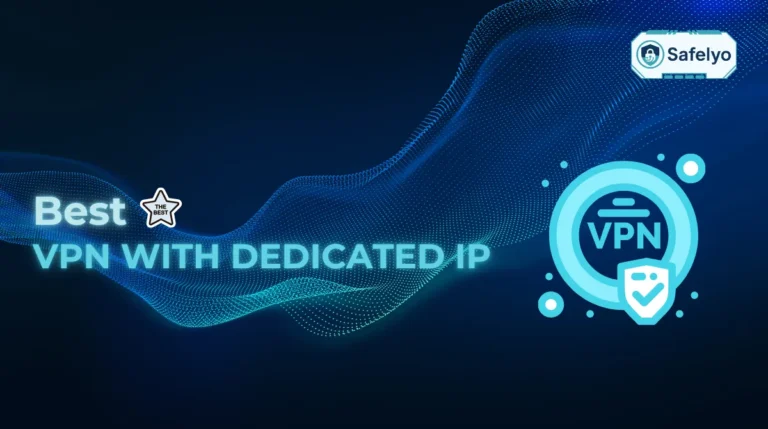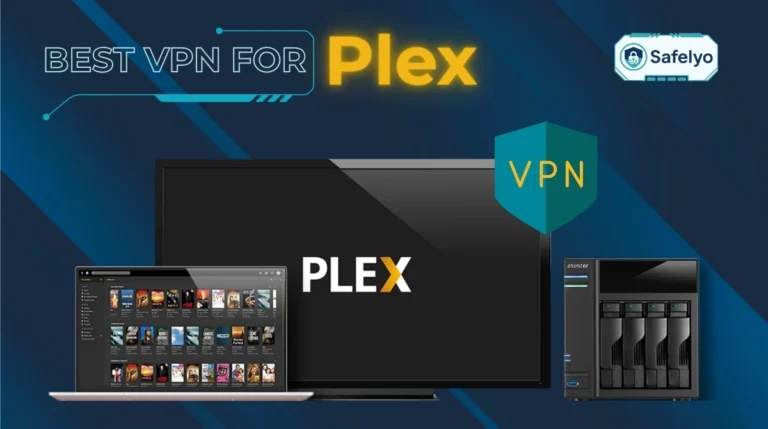Think of the best VPN for working from home as your private, armored commute to the digital office. It creates an encrypted tunnel that shields your company’s data, secures your client communications, and makes your online workspace invisible to prying eyes.
In today’s remote-first world, securing your digital footprint is no longer optional – it’s your first line of professional defense. Whether you’re handling sensitive contracts at a coffee shop, joining a crucial meeting on your home Wi-Fi, or simply trying to avoid ISP throttling, a VPN provides the critical security and stability your career depends on.
With over a decade spent testing cybersecurity tools specifically for remote work environments, I’ve witnessed countless professionals face unnecessary risks by using unprotected networks. A professional-grade VPN isn’t just for IT departments; it’s a fundamental productivity and security tool for every remote worker.
In this comprehensive guide, you’ll discover:
- Why a VPN is a Non-Negotiable Part of Your Remote Toolkit.
- The key professional features, like a dedicated IP and split tunneling, make a real difference.
- Our top VPN picks are rigorously tested for stability, security, and performance.
- How to choose the perfect VPN that aligns with your specific work demands.
Don’t wait for a data breach or a failed video call to take your remote security seriously. Let me guide you in building a secure and efficient workspace, starting right now.
1. TOP 5 best VPN for working from home in 2025
Now for the main event. We’ve put in the hours, tested the connections, and scrutinized the policies to bring you this curated list. Each VPN we’ve selected excels in a specific area, making it ideal for different types of remote professionals – from the solo freelancer to the digital nomad and the corporate employee.
Before we dive into the detailed analysis, here is a quick summary to help you see how our top picks stack up on the most critical metrics for remote work.
| VPN | Best For | Dedicated IP | Stability Rating | Starting Price |
|---|---|---|---|---|
| NordVPN | Overall Performance & Features | Yes (Paid Add-on) | ★★★★★ | ~$3.19/mo |
| Surfshark | Freelancers & Startups | Yes (Paid Add-on) | ★★★★☆ | ~$2.30/mo |
| ExpressVPN | Rock-Solid Stability | No | ★★★★★ | ~$8.32/mo |
| Proton VPN | High-Security Needs | No | ★★★★☆ | ~$4.99/mo |
| Private Internet Access | Power Users & Customization | Yes (Paid Add-on) | ★★★★☆ | ~$2.19/mo |
1.1. #1 – NordVPN
When you need one solution that confidently ticks every box – speed, security, and professional features – NordVPN stands out as the undisputed leader. It’s the go-to choice for a reason, offering a powerful and polished experience for nearly every remote work scenario.
Professional Scorecard:
Stability:
★★★★★
Security & No-log:
★★★★★
(PwC audited)
Dedicated IP:
YES
(Available as an add-on)
Split Tunneling:
YES
(Windows, Android)
Think of NordVPN as the reliable, all-in-one multi-tool in your remote work backpack. It’s our top pick because it strikes the perfect balance between blazing-fast speed, fortress-like security, and genuinely useful professional features. Its proprietary NordLynx protocol ensures my video calls are smooth and file uploads are quick, even when connected to servers halfway across the world. Plus, its Threat Protection feature acts like a vigilant personal assistant, stopping me from accidentally downloading a malicious file or clicking on a phishing link in a work email.
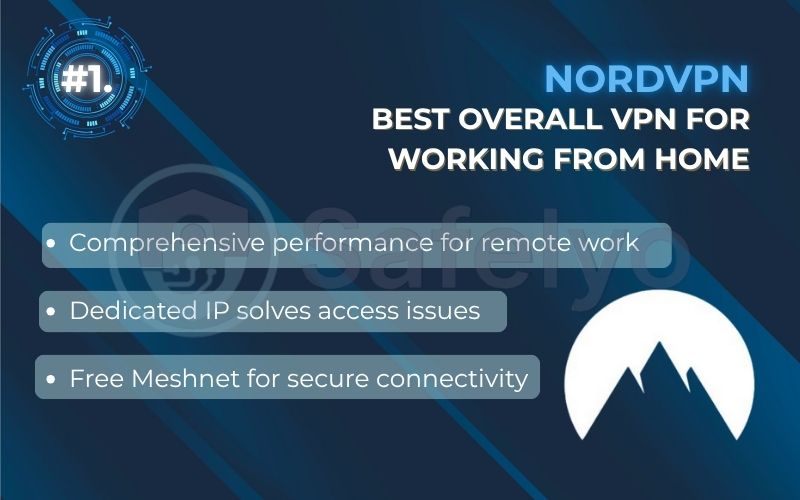
The real game-changer for professionals is the dedicated IP feature. I once had a client whose corporate firewall constantly blocked my access because the shared VPN IP address I was using was on a blacklist. The moment I switched to a NordVPN dedicated IP – a static, clean address that only I use – the problem vanished. It’s a small monthly add-on fee for a huge reduction in professional friction, ensuring consistent access to sensitive work systems.
As a bonus, NordVPN includes Meshnet for free. It’s a brilliant feature that lets you create a secure, private network to link up your devices or even your team’s devices. For example, you can use it to directly and securely access a project file on your office desktop from your travel laptop as if they were on the same Wi-Fi network.
Who is this VPN best for?
- The All-Round Freelancer: You need a perfect mix of speed for large file transfers, robust security for handling client contracts, and the option for a dedicated IP to appear more professional and avoid access issues.
- The Remote Team Leader: You can leverage Meshnet to create a secure, virtual LAN for your team members to share resources without complex IT setup, enhancing collaborative security.
NordVPN: Best overall VPN for working from home
>> Ready for a closer look? Dive into our comprehensive NordVPN review to see its full feature set and performance tests.
1.2. #2 – Surfshark
For professionals who believe top-tier security shouldn’t be limited by device count or budget, Surfshark enters the conversation as a true game-changer. It delivers premium features at a price point that is simply unmatched, especially for those juggling multiple gadgets.
Professional Scorecard:
Stability:
★★★★☆
Security & No-log:
★★★★★
(Deloitte audited)
Dedicated IP:
YES
(Available as an add-on)
Split Tunneling:
YES
(Bypasser)
If NordVPN is the multi-tool, Surfshark is the smart, bulk purchase from a professional supply store. Its core value proposition is impossible to ignore: one subscription protects an unlimited number of devices at an incredibly competitive price. For me, this is a lifesaver. On any given day, I’m working on my laptop, checking messages on my phone, and using a tablet for research. With Surfshark, I don’t have to play a numbers game, deciding which device gets security. Everything is covered, including my family’s devices, under one simple plan.
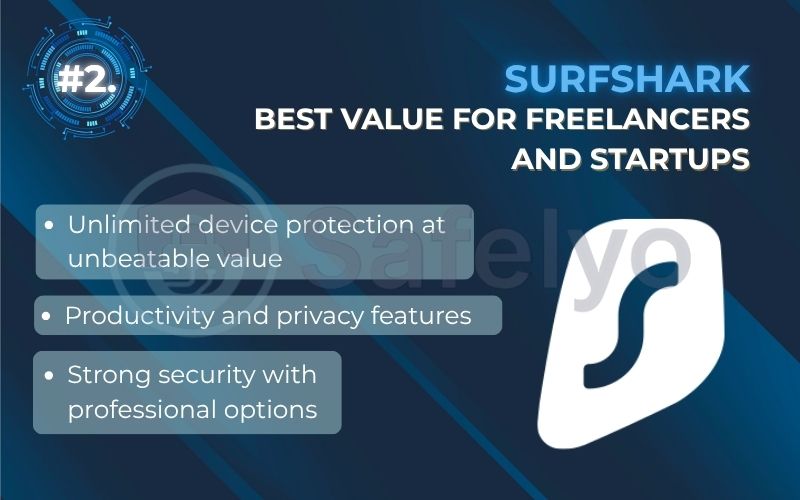
Its CleanWeb feature is also a fantastic productivity booster, automatically blocking ads and malware trackers before they even load. This creates a cleaner, faster, and less distracting browsing experience when I’m deep in research mode. For professionals working in or traveling to countries with internet restrictions, Camouflage Mode is a vital feature that disguises your VPN traffic, making it look like regular internet activity to get past firewalls.
While its stability is very solid, it’s just a hair behind the absolute rock-solid performance of a premium choice like ExpressVPN in our tests, which is a fair trade-off for the incredible value it offers.
Who is this VPN best for?
- The Freelancer with Multiple Gadgets: You have a work laptop, a personal phone, a tablet, and maybe a desktop. Surfshark lets you secure them all without breaking the bank.
- The Bootstrapped Startup: Your small team needs robust security, but your budget is tight. Surfshark provides an enterprise-level benefit (unlimited users/devices) at a fraction of the cost.
Surfshark: Best value for freelancers and startups
>> Think this is the value you need? Explore our full Surfshark review to see how it performs under pressure and if it’s the right fit for you.
1.3. #3 – ExpressVPN
For some professionals, the single most important feature is absolute, unwavering reliability. If you’re willing to invest in a premium service that guarantees a flawless connection for your most critical tasks, ExpressVPN is in a class of its own.
Professional Scorecard:
Stability:
★★★★★
Security & No-log:
★★★★★
(KPMG, Cure53 audited)
Dedicated IP:
NO
(Focus on dynamic IPs for privacy)
Split Tunneling:
YES
ExpressVPN is the premium, chauffeur-driven sedan of the VPN world. It’s the “set-it-and-forget-it” solution for professionals who value flawless reliability above all else. Its defining feature is its unbeatable connection stability, powered by its custom-built Lightway protocol. I once had my home internet fail mid-presentation, forcing my laptop to switch to my phone’s 4G hotspot. ExpressVPN handled the transition so seamlessly that no one on the call even noticed – the connection never dropped. You are paying a premium for that peace of mind.
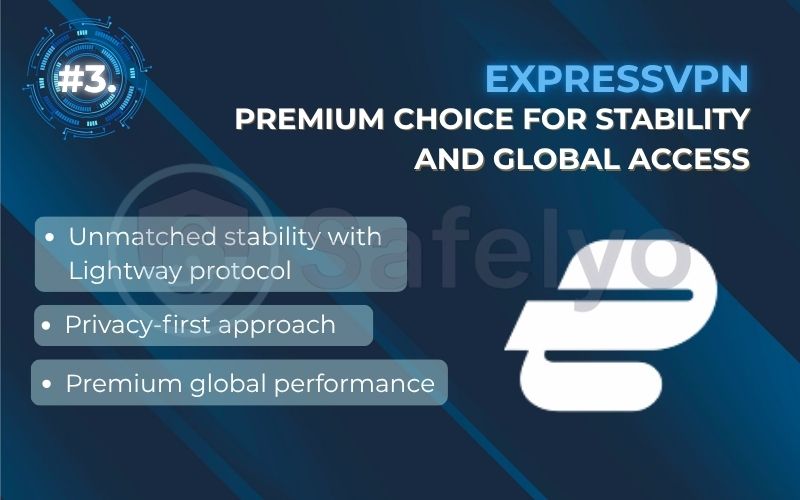
It’s important to note that ExpressVPN deliberately does not offer dedicated IPs. This is a conscious choice prioritizing maximum user privacy, as dynamic IPs (which change every time you connect) make it much harder to trace activity back to a single user.
This makes ExpressVPN less ideal for those who need a static IP for work but a top choice for those whose primary concern is ironclad privacy and a connection that simply works, every time, anywhere in the world.
Who is this VPN best for?
- The C-Level Executive or Consultant: Your time is money, and you cannot afford a dropped connection during a high-stakes board meeting or client call. Reliability is your number one priority.
- The Frequent International Traveler: You’re constantly switching between networks in different countries and need a VPN that provides a consistently fast and stable connection no matter where you are.
ExpressVPN: Premium choice for stability and global access
>> Curious about its flawless performance? See how the Lightway protocol held up in our stress tests in the full ExpressVPN review.
1.4. #4 – Proton VPN
When the data you handle is so sensitive that security is not just a feature but the entire mission, you turn to a specialist. Built by scientists with a background in secure communications, Proton VPN is engineered from the ground up for maximum privacy and trust.
Professional Scorecard:
Stability:
★★★★☆
Security & No-log:
★★★★★
(Swiss-based, audited, open-source)
Dedicated IP:
NO
Split Tunneling:
YES
Proton VPN is the Fort Knox of the internet, built by the same team of scientists from CERN who created the ultra-secure Proton Mail. Its entire philosophy is centered on uncompromising security and privacy, backed by Swiss privacy laws, which are among the strongest in the world.
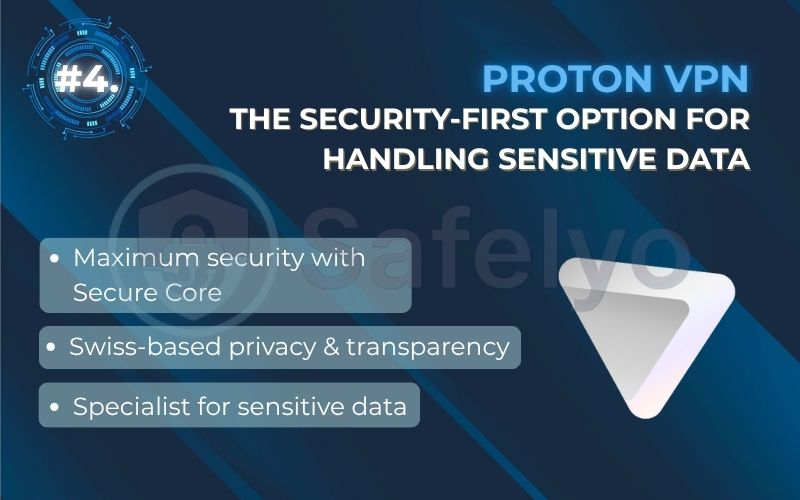
Its standout feature is Secure Core. When I was consulting on a project involving sensitive intellectual property, I used this feature exclusively. It routes your traffic through hardened servers in privacy-friendly countries like Switzerland or Iceland before sending it to your final destination. It’s like sending a sensitive package via an armored car to a secure vault before it’s dispatched for final delivery. This multi-hop connection provides a level of security that standard VPNs simply can’t match.
While it doesn’t offer a dedicated IP, its focus is on making the user as anonymous as possible. For professionals handling truly confidential information, this is not a missing feature but a core principle.
Who is this VPN best for?
- Journalists, Activists, and Researchers: Your work involves highly sensitive data, and your personal security is paramount. The Swiss jurisdiction and Secure Core architecture are non-negotiable benefits.
- Lawyers and Financial Professionals: You have a legal and ethical obligation to protect client confidentiality with the highest possible standards of security.
Proton VPN: The security-first option for handling sensitive data
>> Need maximum security? Read our in-depth Proton VPN review to understand its Secure Core architecture and other privacy features.
1.5. #5 – Private Internet Access (PIA)
Not every professional wants a simple ‘on/off’ switch; some prefer to have the full control panel at their fingertips. Private Internet Access (PIA) caters directly to this power user, offering a level of customization and technical depth that is rare in the consumer VPN space.
Professional Scorecard:
Stability:
★★★★☆
Security & No-log:
★★★★★
(Deloitte audited)
Dedicated IP:
YES
(Available as an add-on)
Split Tunneling:
YES
(Advanced)
Private Internet Access, or PIA, is like a master mechanic’s toolbox for your internet connection. While other VPNs focus on simplicity, PIA provides an unmatched level of control and customization for those who like to tinker under the hood. It’s a long-standing, trusted name in the industry with a proven no-log policy.
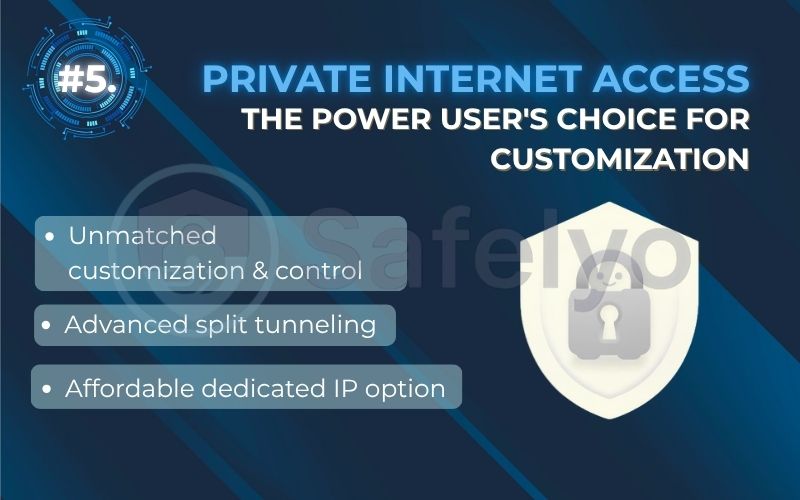
I particularly appreciate its advanced split tunneling. I can set it up not just by application, but also by specific IP addresses. This allowed me to route all my work-related traffic through the VPN, except for a specific local network device (like my printer), which I needed direct access to. It’s a granular level of control that tech-savvy professionals will love. You can even adjust your encryption levels – for instance, dropping from AES-256 to AES-128 to get a slight speed boost for a less sensitive task.
PIA also boasts a massive server network and offers a very affordable dedicated IP option, making it a powerful and versatile choice.
Who is this VPN best for?
- The Tech-Savvy Freelancer: You understand the technical details and want the freedom to configure your connection settings precisely to fit your unique workflow.
- The IT Professional: You need a personal VPN that offers the kind of advanced features and granular control you’re used to managing in a corporate environment.
Private Internet Access (PIA): The power user’s choice for customization
>> Want to take control? Discover all the advanced settings and options in our complete Private Internet Access review.
2. How we selected and tested the best VPNs for remote work
At Safelyo, we know that testing a VPN for remote work is completely different from testing one for streaming movies. Your productivity and professional reputation are on the line, so we designed a testing process that simulates a real, high-pressure workday. We didn’t just run a speed test and call it a day.
Here’s a peek behind the curtain at our professional testing checklist, focusing on what truly matters to you:
Stability and performance.
Instead of just chasing the highest download number, we measured connection consistency. I ran two-hour-long Zoom calls, transferred multi-gigabyte project files, and kept the connection active for an entire 8-hour workday to see if it would drop or lag under real-world pressure.
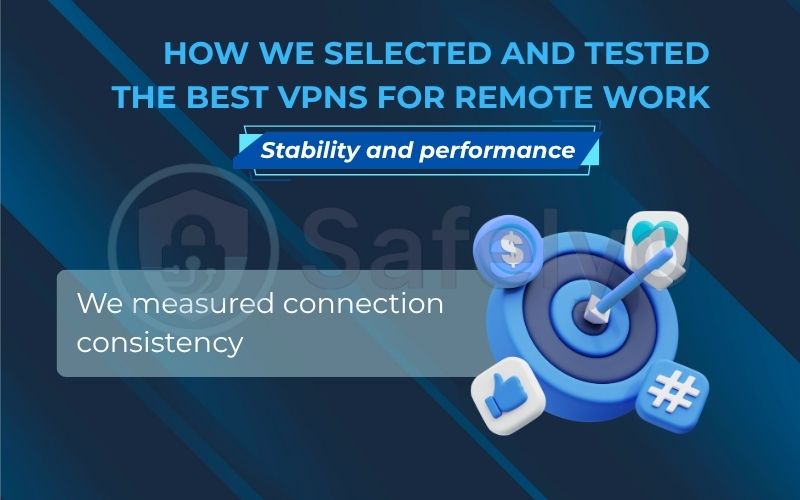
Security suite & privacy policy.
A simple “we don’t log” promise isn’t enough when client data is on the line. We dig into the fine print, confirm they use industry-standard AES-256 encryption, and most importantly, we only recommend VPNs whose no-log claims have been verified by independent auditors like Deloitte or PwC.
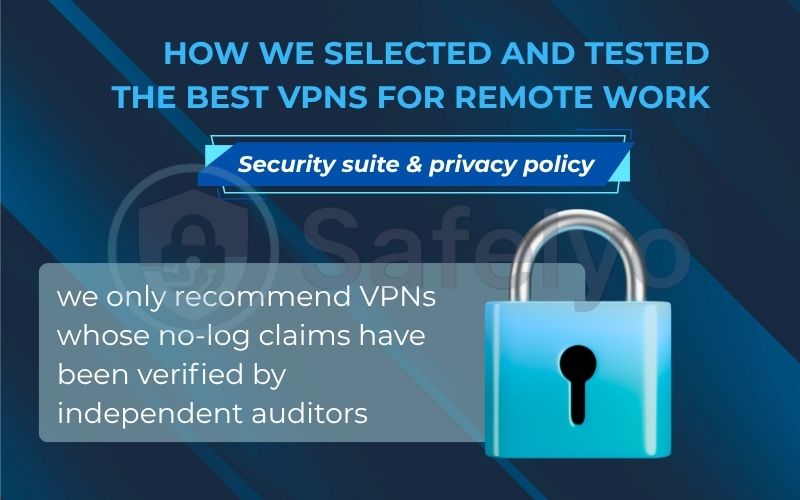
Professional features.
These aren’t just buzzwords; they’re productivity tools. We tested how easy it is to get a dedicated IP address and how intuitively the split tunneling feature works. For example, could I easily route my work email through the VPN while letting my music streaming app use my regular internet?
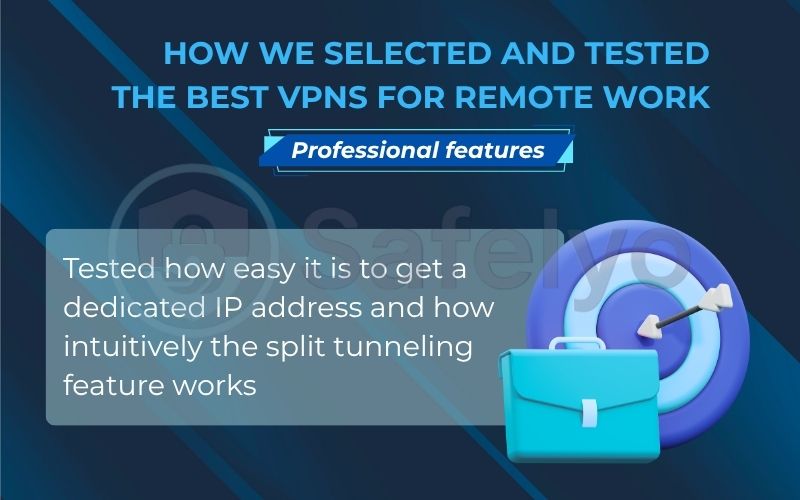
Server network.
It’s not about having the most servers, but having the right servers in the right places. We specifically looked for reliable, high-performance servers in major global business hubs to ensure you get a fast and stable connection, whether you’re connecting to an office in New York or Frankfurt.
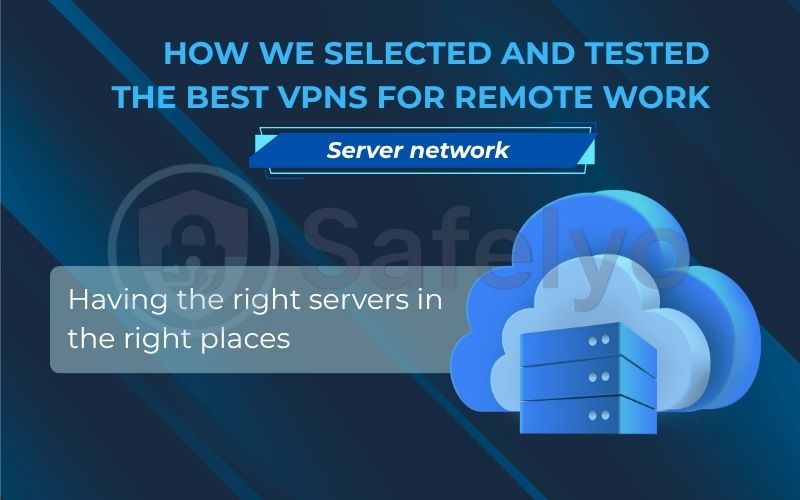
Value for money.
Finally, we weigh the cost against the professional-grade features offered. The best value isn’t always the cheapest price; it’s the service that provides the most robust and reliable toolkit to protect and support your work.
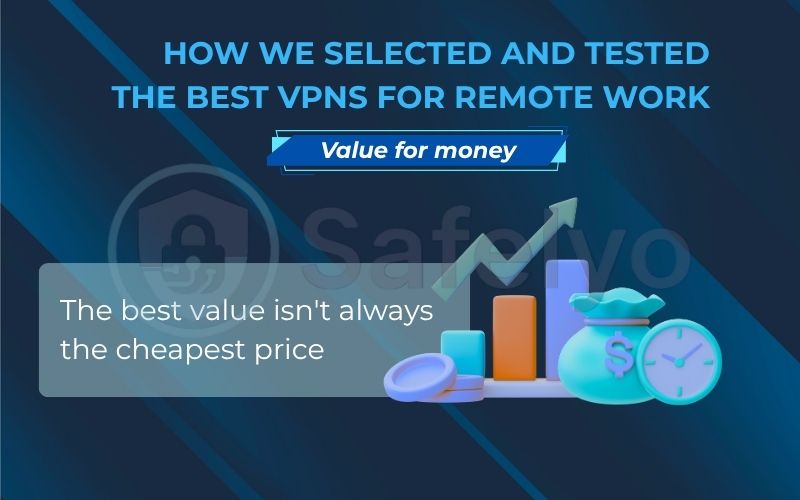
3. Why a VPN is non-negotiable for remote workers
When you worked in a traditional office, you had a locked door, a secure internal network, and an IT department to handle threats. For a remote worker, a high-quality VPN serves all those functions and more. It’s not a “nice-to-have” tech accessory; it’s the digital lock on your office door.
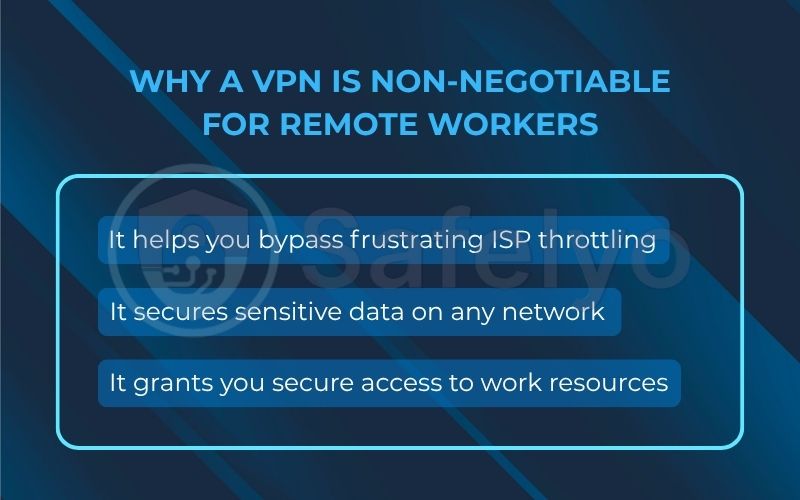
Here’s why it’s an essential part of your professional toolkit:
It secures sensitive data on any network.
Imagine you’re at a local coffee shop finishing a client proposal. Without a VPN, anyone else on that public Wi-Fi could potentially “listen in” and intercept that sensitive information. A VPN wraps your connection in a layer of powerful encryption, making your data completely unreadable to outsiders.
It helps you bypass frustrating ISP throttling.
Ever been in a critical Zoom call and suddenly your video starts lagging for no reason? Your internet service provider (ISP) might be slowing down your connection because it detects high-bandwidth activity. By encrypting your traffic, a VPN hides what you’re doing from your ISP, often leading to a more stable and consistent connection for those vital video conferences.
It grants you secure access to work resources.
Many companies restrict access to their internal servers or cloud platforms to specific IP addresses for security. A VPN allows you to connect to your company’s network as if you were physically sitting in the office, giving you a secure keycard to access the files and tools you need from anywhere in the world.
These aren’t just theoretical dangers. Reports from sources like Forbes have consistently highlighted the dramatic increase in cyberattacks targeting remote workers since the global shift in work culture.
I remember a time when a team member was working from an airport lounge between flights. They were about to connect to the public Wi-Fi when their always-on VPN alerted them to a potential “man-in-the-middle” sniffing attempt on the network. The VPN blocked it instantly. That simple, automated layer of defense prevented a potential data leak that could have compromised client information. In short, it’s a must-have shield for the modern professional.
4. The remote worker’s toolkit: Dedicated IP and split tunneling explained
Beyond the standard features, two tools have fundamentally changed how I work remotely for the better: a dedicated IP and split tunneling. Understanding what they do is key to unlocking a new level of professional efficiency and security.
4.1. Dedicated IP: Your key to consistent and professional access
In simple terms, a dedicated IP is your own private, reserved parking spot on the internet. While most VPN users share a parking lot (a shared IP address), you get a specific spot that only you can use.
This might sound like a small thing, but its professional benefits are huge. Before I started using a dedicated IP, I felt like I spent half my day proving I wasn’t a robot. I was constantly hit with CAPTCHA requests and security flags when logging into client portals because the shared IP I was using had been flagged by someone else’s activity. With a dedicated IP, that all disappears.
Here’s what it does for you:
- It stops you from being blacklisted. You won’t be punished for the “bad behavior” of another user on a shared IP address.
- It allows access to secure, IP-restricted networks. Many corporate or banking systems only allow access from pre-approved IP addresses. Your dedicated IP becomes your digital keycard.
- It’s better for hosting. If you need to host a small portfolio website or access a remote server securely, a static IP is often a requirement.
| VPN Provider | Dedicated IP | Approx. Monthly Cost |
| NordVPN | Yes | ~$3.75 – $5.00 |
| Surfshark | Yes | ~$3.75 |
| Private Internet Access | Yes | ~$2.50 |
4.2. Split tunneling: Manage work and personal traffic efficiently
Split tunneling is like having a special, secure express lane on the highway for your work traffic, while your personal traffic uses the regular lanes. It lets you choose which apps on your computer use the VPN and which ones connect directly to the internet.
My own setup is a perfect example of this in action.
- Through the VPN (The Express Lane): I route my work browser, Slack, and Outlook through the VPN. This ensures all my professional communications and client data are fully encrypted and secure.
- Bypassing the VPN (The Regular Lanes): At the same time, my Spotify app connects directly to my home internet for the best speed, and my printer can still communicate with my laptop over the local network.
This means my work is secure, my music never buffers, and I don’t have to turn the VPN off and on just to print a document. It’s the ultimate tool for balancing security and convenience in a work-from-home environment.
5. VPNs to avoid for remote work (and why)
Just as important as knowing what to look for is knowing what to avoid. In my years of testing, I’ve learned that some types of VPNs might be fine for casual browsing, but they present serious risks when your professional life is on the line. I have a simple rule: if a VPN’s business model seems too good to be true, it probably is, and I would never trust it with my work data.
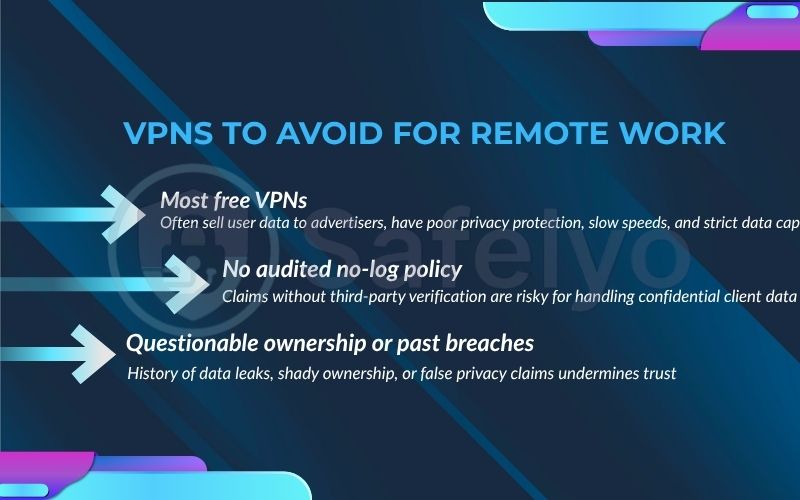
Here are the biggest red flags to watch out for:
Most free VPNs.
This is the most common trap. Running a secure VPN network is expensive. If you aren’t paying with money, you are likely paying with your data. Many free services make money by tracking your browsing habits and selling that information to advertisers. Beyond the privacy nightmare, they often have crippling speed limits and data caps, which can bring your workday to a grinding halt during a file download or video call.
VPNs with no audited no-log policy.
Any VPN can claim it doesn’t keep logs of your activity. But for professional use, a promise isn’t enough. I only trust my data to services that have undergone independent, third-party audits to prove their claims. Without that proof, you are taking a massive gamble with your client’s confidential information.
VPNs with questionable ownership or a history of breaches.
A company’s reputation matters. I always do a quick search on a VPN provider before testing. If they have a documented history of data breaches, shady ownership, or have been caught logging user data despite their claims, they are an immediate “no” for me. Your professional security depends on the integrity of the provider.
>> Read more: Best VPN with Dedicated IP in 2025 (Top 5 Reviewed)
6. FAQ about the best VPN for working from home
I get asked a lot of questions about using VPNs for professional purposes. Here are quick, direct answers to some of the most common queries I receive from fellow remote workers.
Which is the best VPN for working from home?
Based on our extensive testing, NordVPN is the best overall VPN for remote work. It offers the best combination of speed, high-end security features, and professional add-ons like a dedicated IP, making it a powerful and reliable choice for most users.
Can I use a VPN if I work from home?
Absolutely, and you should. Using a quality VPN when you work from home is a critical security step. It encrypts your connection to protect sensitive company and client data, secures you on any network (even your home Wi-Fi), and can help prevent your internet provider from slowing down your connection.
How to use a VPN for remote jobs?
It’s simple. First, choose a reputable VPN from this guide and subscribe. Then, download and install the app on your work device. To use it, just open the app, log in, and click “Connect.” For maximum security, I recommend leaving the VPN connected for your entire workday.
Can my employer track me if I use a personal VPN for work?
A personal VPN encrypts your connection and hides your online activity from your employer and internet provider. However, if you are using a company-owned device with monitoring software installed, your employer can still see your activities on that device. A VPN protects the connection, not the device itself.
Is it ok to leave the VPN on all the time when working from home?
Yes, it is the highly recommended practice for maximum security. Modern, premium VPNs are designed for 24/7 operation with minimal impact on performance. Leaving it on ensures that all your activities, including background apps sending data, are always protected.
What’s the difference between a corporate VPN and a personal VPN?
A corporate VPN is given to you by your employer specifically to access the company’s private network. A personal VPN (like those in this guide) is a tool you buy to protect your general internet privacy on any network. They serve different primary purposes, but I often use them together for layered security.
Will a VPN slow down my Zoom calls?
A top-tier VPN will have a negligible impact on speed. In some cases, it can actually improve call stability. By encrypting your traffic, a VPN can bypass ISP throttling that often targets high-bandwidth activities like video conferencing, resulting in a smoother, more reliable connection.
How much should you pay for a VPN?
For a reliable, professional-grade VPN, you should expect to pay between $2 $5 per month when signing up for a longer-term plan. Premium options with exceptional stability, like ExpressVPN, can cost more. Avoid free VPNs for any professional work.
7. Conclusion
Choosing the best VPN for working from home is a critical investment in your professional security, stability, and productivity. It’s the modern-day equivalent of locking your office door, ensuring that your digital workspace is as secure and efficient as possible, no matter where you are.
To recap, here are the key takeaways to remember:
- A VPN is non-negotiable for remote workers to protect sensitive data and ensure stable connections.
- Professional features like a dedicated IP and split tunneling are game-changers for efficiency and access.
- NordVPN offers the best overall package, Surfshark provides unbeatable value for multiple devices, and ExpressVPN delivers premium, rock-solid stability.
- Always avoid free VPNs and prioritize providers with independently audited no-log policies.
Don’t wait for a security incident to happen. Take proactive control of your professional environment today. Let Safelyo be your trusted resource, and explore our full Best VPN category to find the perfect solution that meets your demanding needs.

